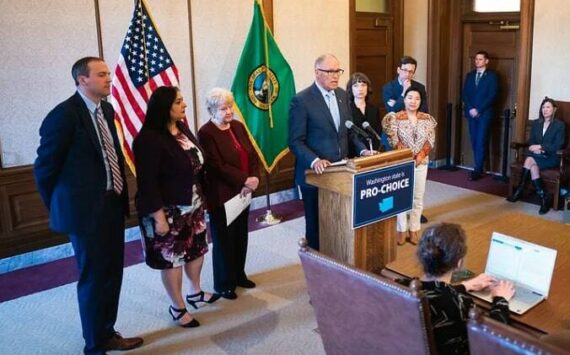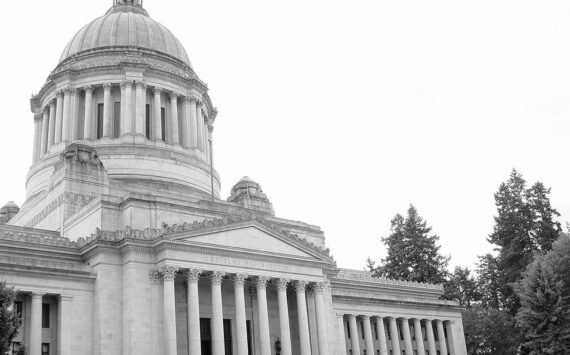OLYMPIA — A citizens panel may give state lawmakers and the governor a raise.
The Washington Citizens’ Commission on Salaries for Elected Officials also is looking to boost earnings of the other eight statewide officeholders and every judge in the state, from district court up to the Supreme Court.
Commissioners are recommending a 4 percent increase for legislators and Gov. Jay Inslee, half coming Sept. 1 and the other half in September 2018. They are suggesting the same amounts for the offices of lieutenant governor, attorney general, secretary of state, commissioner of public lands, treasurer and auditor.
They are proposing an 8 percent increase for the superintendent of public instruction over the next two years, a move commissioners said would recognize the amount of responsibility compared to similar jobs in other states.
And the panel is seeking to give the insurance commissioner and all judges a 6 percent increase, 4 percent this fall and 2 percent next year.
Commissioners will hold a final public hearing then vote at their May 17 meeting at the Radisson Hotel in SeaTac.
Some lawmakers reached this week said they knew the panel had been holding meetings but not the result.
“It’s been strangely quiet,” said Senate Majority Leader Mark Schoesler, R-Ritzville, on Wednesday. “I’ve never asked for nor will I ever ask for a raise. I let them operate on their own. No matter what increase they propose, for anything above zero there will be criticism.”
Proposed 2017-18 salaries for state government officials
| Position | Current salary | Effective 9/1/2017 | Effective 9/1/2018 |
|---|---|---|---|
| Governor | $173,617 | $177,089 | $180,631 |
| Lieutenant governor | $101,889 | $103,927 | $106,005 |
| Secretary of state | $121,663 | $124,096 | $126,578 |
| Treasurer | $140,438 | $143,247 | $146,112 |
| Auditor | $121,663 | $124,096 | $126,578 |
| Attorney General | $159,395 | $162,583 | $165,835 |
| Insurance commissioner | $124,061 | $129,023 | $131,604 |
| Superintendent of public instruction | $134,212 | $139,580 | $145,164 |
| Commissioner of public lands | $132,858 | $135,515 | $138,225 |
| Position | Current salary | Effective 9/1/2017 | Effective 9/1/2018 |
|---|---|---|---|
| Supreme Court chief justice | $185,661 | $193,087 | $196,949 |
| Supreme Court justices | $183,021 | $190,342 | $194,149 |
| Court of Appeals judges | $174,224 | $181,193 | $184,817 |
| Superior court judges | $165,870 | $172,505 | $175,955 |
| District court judges | $157,933 | $164,250 | $167,535 |
| Position | Current salary | Effective 9/1/2017 | Effective 9/1/2018 |
|---|---|---|---|
| Legislator | $46,839 | $47,776 | $48,731 |
| Speaker of the House | $55,738 | $56,853 | $57,990 |
| Senate majority leader | $55,738 | $56,853 | $57,990 |
| House minority leader | $51,288 | $52,314 | $53,360 |
| Senate minority leader | $51,288 | $52,314 | $53,360 |
Source: Washington Citizens’ Commission on Salaries for Elected Officials
When told the amount, he said it is comparable to what lawmakers are considering for school employees and most state workers in the next two-year state budget.
New collective bargaining agreements negotiated by the governor’s office with state worker unions call for the majority of workers to receive 6 percent increases over the course of the next budget.
Commissioners invited leaders of the Democratic and Republican caucuses in the House and Senate to make presentations at their January meeting. None showed up.
“We did not send anybody by choice. We just decided they were doing all the right things without us,” said Sen. John McCoy, D-Tulalip, chairman of the Senate Democratic Caucus.
As for the recommended amount, “It’s not up to me,” he said. “It’s not my choice.”
Superintendent of Public Instruction Chris Reykdal sent a representative to the January meeting to request a bump in pay. The commission’s recommendation would increase the superintendent’s salary from its current $134,212 to $145,164 in 2018.
“It brings the salary closer to that of other state superintendents, as well as superintendents within Washington,” said Nathan Olson, communications manager for Reykdal. “It will help attract the best candidates for the position in the future.”
The commission, tasked with considering salary changes every two years, is funded by the state but operates independent of the legislative, executive and judicial branches.
Its 17 members include residents from the state’s 10 congressional districts plus representatives of business, organized labor and higher education. Also represented are the legal and human resources professions.
Over the course of several months, they discussed the responsibilities of each job and reviewed salary data of elected officials in other states and conducted hearings. In January, a majority settled on an across-the-board increase of 4 percent plus extra for judges and the two statewide offices.
They conducted public hearings in February, March and April leading up the final May meeting. Its decisions are final and none of the elected officials can reject a pay hike.
There are ways for them to temporarily reject pay raises and lower their monthly take home.
In 2015, commissioners approved an 11 percent raise for lawmakers with a portion intended to offset eight years of no increases. Like now, the Legislature went into special session and some lawmakers said they would decline to keep the added pay if state workers did not get wage hikes as part of a final budget deal. Workers got a raise so no lawmaker lost out.
In 2012, when lawmakers pared state worker salaries by 3 percent, several elected officials voluntarily requested their pay be reduced by 3 percent. House and Senate administrators handled the requests.
Raises proposed by the current commission would boost the annual pay for 143 lawmakers from the current $46,839 to $47,776 Sept. 1 and to $48,731 effective September 2018. Leaders of the four caucuses earn more because of their added responsibilities.
Inslee’s salary would rise from the present $173,617 to $180,631 in 2018 while Chief Justice Mary Fairhurst’s earnings would climb from its current $185,661 to $196,949. Superior Court judges would earn $175,955 in 2018, up from $165,870 today.
Freshman Rep. Shelley Kloba, D-Kirkland, said Thursday that as a member of the Kirkland City Council she took part in setting salaries for city workers. Job duties and performance are key factors, she said. So, too, is how a level of pay affects the ability to recruit and retain personnel.
When applying the approach to lawmakers, she said salaries need to be enough to support someone, and their family, if it is their sole source of income. If lawmaker salaries are too low, the only people who can afford to serve in the Legislature will be retired millionaires and independently wealthy individuals.
“I trust the independence of the salary commission to do their due diligence before making a final decision,” she said.
Jerry Cornfield: 360-352-8623; jcornfield@heraldnet.com. Twitter: @dospueblos.







